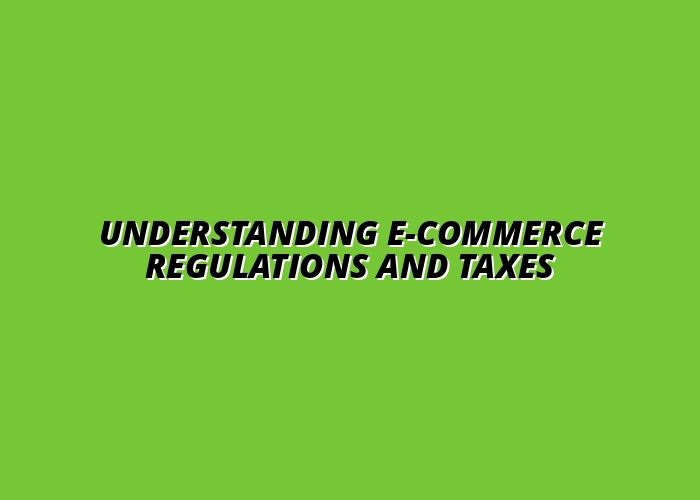Builds Trust
Maintaining compliance enhances trust with customers and suppliers, fostering stronger business relationships.
Join The Cash Automator community and receive expert strategies to build automated online income streams directly in your inbox.
Posted on: 2025-09-14
By: Liam Corbin
In a rapidly evolving e-commerce landscape, navigating tax compliance can feel like walking a tightrope. With regulations changing frequently, how can you ensure your business not only survives but thrives? Understanding the rules is essential, and the right knowledge will empower you to build a sustainable online business!
Understanding the significance of tax compliance in e-commerce can provide a strong foundation for business success. For more insights on building a robust online presence, consider exploring strategies for building a successful e-commerce site.
Maintaining compliance enhances trust with customers and suppliers, fostering stronger business relationships.
Being compliant reduces the risk of costly fines and legal troubles, allowing you to focus on growth.
A compliant business is viewed as legitimate, improving overall market reputation.
Understanding tax laws can lead to exemptions and deductions, reducing overall tax burden.
In the world of online selling, navigating e-commerce regulations and ensuring tax compliance can feel overwhelming. However, it's crucial for anyone looking to thrive in this space. Think of it as a roadmap—without understanding the rules, you risk getting lost and facing penalties. At The Cash Automator, we believe that knowing the ins and outs of e-commerce regulations is the cornerstone of building a successful online business.
So, why does tax compliance matter so much for online sellers? It's not just about avoiding trouble; it's about creating a sustainable business model that can grow and adapt. By understanding your obligations, you can focus on what you do best—growing your income streams!
Tax compliance is essential for several reasons. Firstly, it helps maintain your business's legitimacy. When you're compliant, you build trust with your customers and suppliers. Secondly, being aware of your tax obligations can save you money in the long run. You'll avoid costly fines and penalties that come with non-compliance!
Moreover, understanding tax laws can open up opportunities for your business. For instance, there might be exemptions or deductions available that can significantly reduce your tax burden. By staying informed, you can take full advantage of these benefits! This proactive approach is similar to how you might automate to grow your business in other areas.
At its core, e-commerce regulations encompass all the laws that govern online selling. This includes sales tax, which varies by state and sometimes even by city! It's essential to know where your customers are located and what tax rules apply to them. For instance, if you're selling to customers in multiple states, you could be subject to various sales tax rates.
Sales tax is typically charged as a percentage of the sale price. This means that if you’re not collecting it correctly, you could find yourself on the hook for missed payments. That’s why understanding the basics is vital!
Being proactive about your tax obligations is a game-changer. Laws change frequently, and keeping up with these changes can prevent headaches down the line. Joining online forums, subscribing to e-commerce newsletters, or following reliable tax blogs can be a great way to stay updated!
Remember, the goal is to be informed and prepared. When you know what's changing, you can adjust your strategies accordingly, ensuring your business remains compliant and efficient.
Marketplace facilitator laws are a relatively new addition to the e-commerce landscape. These laws require platforms like Amazon and eBay to collect and remit sales tax on behalf of their sellers. This means that if you're selling through these channels, they handle some of the tax responsibilities for you!
However, this doesn’t mean you can take a back seat. You still have to be aware of the laws that affect you and ensure you’re compliant in other areas of your business. By understanding these laws, you can better manage your tax obligations!
Tax exemptions can be a real boon for e-commerce businesses, allowing you to save money that can be reinvested. In many jurisdictions, certain items may be tax-exempt or have lower tax rates. Common exemptions include:
It's essential to research and understand what exemptions apply to your business. Don’t leave money on the table—leverage exemptions to boost your bottom line!
Did you know that leveraging automated tax compliance solutions can save you countless hours and reduce the risk of errors? By integrating these tools into your e-commerce platform, you can ensure accurate tax calculations and timely filings, allowing you to focus on growing your business while staying compliant.
When diving into the world of e-commerce, one of the biggest hurdles many sellers face is navigating the complex landscape of tax compliance. As an online seller, you might wonder, "What happens if I mess up my tax obligations?" This is an important question, and understanding the answers can save you from headaches down the road. Let's tackle some common concerns that e-commerce businesses encounter and how to effectively address them!
It’s crucial to recognize that compliance challenges are not just about understanding what taxes to collect. It’s also about knowing the consequences of non-compliance. These can range from fines and penalties to even criminal charges in severe cases. The good news is, with the right knowledge and tools, you can navigate these challenges effectively.
In the realm of e-commerce, questions about tax compliance come up often. To simplify things, here is a list of frequently asked questions that many sellers, including those at The Cash Automator, encounter:
Not complying with tax regulations can lead to serious consequences. For starters, you might face hefty fines or late fees, which can quickly add up. Additionally, tax authorities may conduct audits that can be intrusive and time-consuming. For many sellers, the stress and impact on their business growth can be overwhelming. Remember, staying compliant is more than just avoiding penalties—it’s about peace of mind and focusing on what you love—growing your business!
Moreover, in severe cases, prolonged non-compliance can lead to criminal charges. This is an outcome that no one wants to face! Keeping organized records and staying updated on current tax laws can help you avoid these pitfalls. To further protect your business, consider implementing automated income strategies.
Facing a tax audit might seem daunting, but it doesn’t have to be! Here are steps to handle tax audits smoothly:
Tax jurisdictions can be tricky, especially if you sell across different states or countries. Each jurisdiction may have its own rules, rates, and requirements, which can complicate tax compliance. Many sellers find that they are subject to different tax rates based on where their customers live. This means you need to stay informed about where your business operates, even if you're just starting out!
To avoid headaches, I recommend creating a chart that outlines the tax rates and regulations for each jurisdiction where you sell. This can serve as a quick reference and help you stay compliant. Plus, it’s a great way to empower yourself with knowledge, making your journey in e-commerce even more fulfilling! For a deeper dive into managing various aspects of your business efficiently, explore tips for efficient e-commerce inventory management.
As we wrap up, remember that understanding tax compliance is crucial for the growth of your e-commerce business. At The Cash Automator, we believe that being proactive in your approach can lead to greater success and less stress. By keeping informed and organized, you can navigate the complexities of e-commerce taxes with ease!
So, what are your next steps? Start by reviewing the key takeaways we've discussed, and create a plan to address your tax compliance needs. Engaging with tax professionals and utilizing resources from e-commerce associations can also prove invaluable as you navigate this terrain.
Taking action is the first step towards ensuring that your e-commerce journey remains smooth and rewarding. Don’t hesitate to reach out for support; you’re not alone on this exciting path to building automated income streams! For further guidance on building robust income streams, consider reading about building automated income streams.
Here is a quick recap of the important points discussed in the article:

 As we stand on the brink of a transformative era defined by automation, the landscape of income dyna
As we stand on the brink of a transformative era defined by automation, the landscape of income dyna
 Content marketing is more than just a buzzword; it's the backbone of successful affiliate marketing.
Content marketing is more than just a buzzword; it's the backbone of successful affiliate marketing.
 Did you know that nearly 70% of consumers rely on content from resource pages to make informed purch
Did you know that nearly 70% of consumers rely on content from resource pages to make informed purch